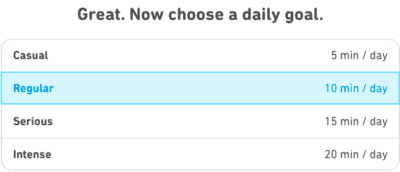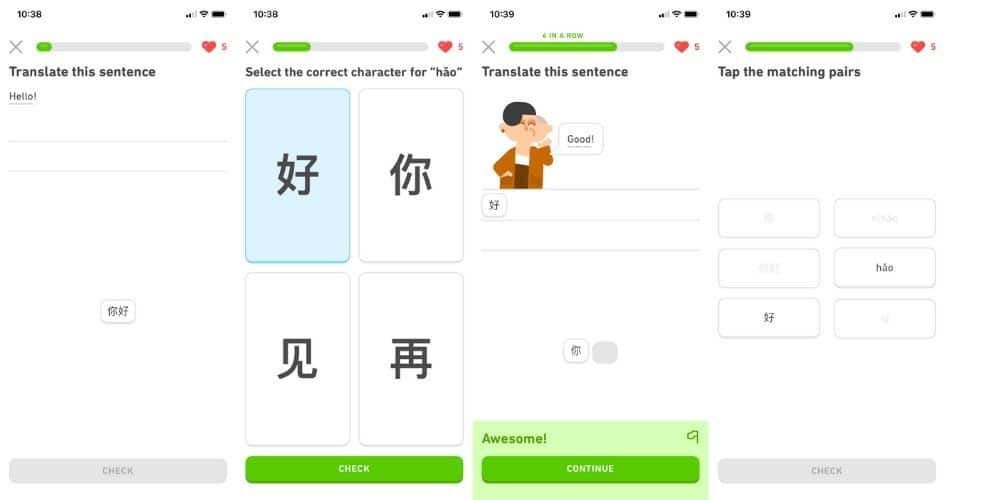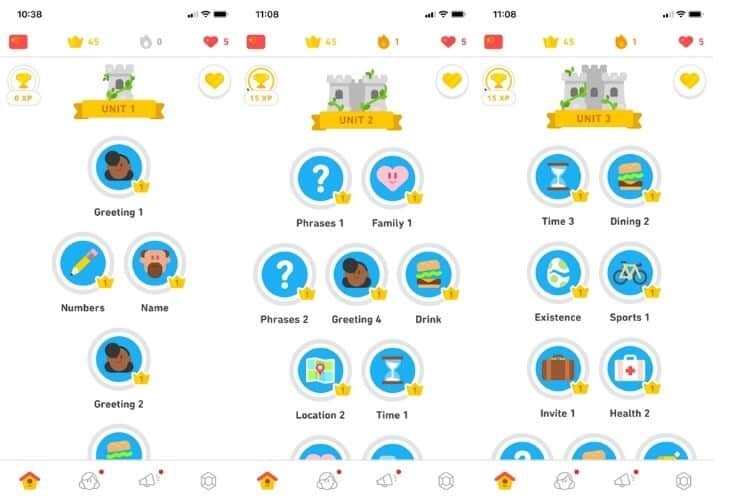
The number of Mandarin learning resources on the market today is absolutely stupendous.
It’s almost like there are too many sites, apps, and programs to choose from in order to get started.
One of the most renowned language learning apps on the market, particularly for newbies, is Duolingo.
If you’ve looked for independent reviews about Duolingo’s Mandarin course, you might have found yourself a mixed bag of opinions. Some people really aren’t fans of the app, and some people rate it quite highly.
But the simple question lies in the title of this post: will using the Duolingo app teach you Mandarin Chinese, and how far will it get you?
Completing the Mandarin course on Duolingo will teach you the basics quite well, but that’s as far as it goes. Once you get to the end of the Duolingo Mandarin course and find yourself at an advanced beginner stage, you’ll need to branch out into other ways of learning. You’ll definitely be ready to take on lower-intermediate level learning material after you’ve completed all learning material on Duolingo.
I would tend to agree that other language courses on Duolingo (particularly European languages) are better than the Mandarin course, and you could probably reach a competent conversationalist stage with Spanish, French, or German with Duolingo.
However, Mandarin is a different animal, and you’ll need more time with the language to get to a higher stage of proficiency.
What’s good about the Duolingo Mandarin course?
- It’s free
- It’s easy to use
- It’s kind of addictive (this can be good and bad)
- Study sessions are short and easy to complete for busy people
- Did I mention it’s free?
- Good for newbies
Why is Duolingo good for newbies?
Think of Duolingo as a ‘taste of learning’.
The reality is most people who start learning a language give up on it within a few short weeks. I don’t have any exact figures for language learners who give up, but based on the words of friends and acquaintances and pure guesswork, I’d put the ‘quitter figure’ at well over 90%.
This isn’t a complaint about those who quit, but it’s one of the main reasons Duolingo does so well with the beginner’s market.
Getting started with Mandarin Chinese on Duolingo is like the ultimate low pressure, low cost, low commitment endeavour.
You can get straight to work on it without contemplating the thousands of hours ahead of you you’ll need to reach a decent level of proficiency.
How does Duolingo work?
Duolingo starts off by introducing a few basic vocab items and a new grammar structure in one 5-10 minute study session.
You can opt for an ‘intense’ schedule of 20 minutes a day if you’re feeling super motivated.

The study sessions themselves mostly revolve around multiple-choice questions and basic translations.
One good aspect of the study sessions is that you’ll hit the new language from different angles, so to speak. You’ll hear, read, speak… but you won’t write. I mean, you’ll type a little bit. There is no handwriting/calligraphy function in Duolingo.

If you complete your daily study sessions, you’ll gradually move on and unlock more difficult learning material.

Where does Duolingo fall short for learning Mandarin?
- Gamified learning can get boring quite quickly for some folks.
- Lack of learning material beyond a high-beginner level.
- No longer form learning content – this is vital for progressing in the language.
- No handwriting or focus on formation of characters.
- Not enough exposure to the language.
Although I think Duolingo is a solid recommendation for complete beginners who want a gentle introduction to Mandarin, there are some gaps that need to be filled.
If you’re learning to read or write characters, a simple guide to character radicals and components is essential. A lot of new learners skip over this and regret it later. Learning the very foundations of characters makes it much easier to learn more characters later. Don’t skip this part.
My guide to character radicals and components can be found here.
My second main issue with Duolingo isn’t really with the app itself.
An ‘intense’ study session at 20 minutes a day with Duolingo isn’t enough to make a real, solid, noticeable progression in Chinese when you get to a higher level.
Are you a complete beginner? That’s fine – you can get started with Duolingo.
Just remember that if you’re struggling to stay motivated to play a game on your phone for 10-20 minutes daily, are you really going to be able to watch a Chinese movie, listen to a lengthy podcast, or read a Chinese novel someday?
I understand that we’re all busy people – but to reach the highest heights of Mandarin, you’re going to have to scale up your time spent with the language.
Are there alternatives to Duolingo?
There are quite a number of apps that basically copy the Duolingo learning model.
They are Hello Chinese, Lingodeer, and ChineseSkill.
Be aware that all of these apps, in the grand scheme of things, do the same thing as Duolingo. If you really want to learn Mandarin Chinese, choosing one of these apps over the other isn’t going to make a difference to how much Mandarin you learn.
- ChineseSkill – Probably the best of the bunch. ChineseSkill includes a lot of learning material and a handwriting (or finger wiping) function in the app to learn characters. You can pay for the upgraded version, but the free version is fine.
- Hello Chinese – I don’t think there’s as much learning content as ChineseSkill but Hello Chinese has a handwriting function as well now. Hello Chinese is free, too.
- Lingodeer – This app also provides a lot of learning content but you have to pay to get the most out of it. Lingodeer is $13.99 a month, but cheaper for longer terms subscriptions. There are better ways to spend your money, in my opinion.
As I said at the beginning of this post, there are loads of resources for learning Mandarin. If you want to branch out from Duolingo, check out the following posts.
- THE 21 BEST APPS TO LEARN CHINESE
- THE 24 BEST MANDARIN STUDY RESOURCES FOR BEGINNERS
- LEARNING CHINESE: 15+ LISTENING TOOLS PERFECT FOR BEGINNERS
Is Duolingo worth it when it comes to learning Mandarin Chinese?
If you’re a newbie to Mandarin Chinese and you want to learn basic vocab and grammar patterns, Duolingo is absolutely fine for you.
It’s true that Duolingo has better language courses in its collection, but its Mandarin course serves a purpose and can take you through the beginner’s stage of the language.
If you feel that you need to branch out from studying with Duolingo and you need a more ‘meaty’ course, take a look at some posts in the further reading section below.
If you’re looking for other Mandarin learning-related material, head to the homepage and search in the search bar.
再见!
Further Reading
- 100+ MANDARIN LEARNING RESOURCES: THE FASTEST WAY TO FLUENCY
- THE ULTIMATE GUIDE TO LEARNING CHINESE IN CHINA
- 14 REASONS WHY YOU SHOULD LEARN MANDARIN CHINESE
- IS IT EASY TO LEARN MANDARIN CHINESE?
- STUDYING MANDARIN AT A UNIVERSITY IN CHINA: WHAT YOU NEED TO KNOW
- 100+ PODCASTS FOR LEARNING CHINESE | BEGINNER TO ADVANCED MATERIAL
- 101 TV SHOWS FOR CHINESE LEARNERS
